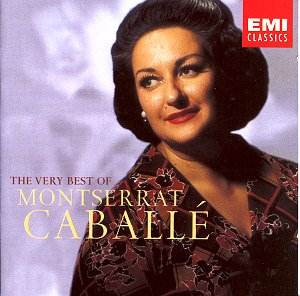Caballé served her operatic stage apprenticeship at
the Basle Opera where she sang a very varied repertoire that included
the classic Mozart roles of Pamina, Donna Anna and Fiordiligi, as well
as the distinctly heavier parts of Aida, Salome, Tatyana and the Tannhäuser
Elisabeth. In a small, well-run ensemble house it was ideal preparation
for the extended career she was to enjoy. Caballé graduated to
the Vienna State Opera in 1960, and the Barcelona Liceu in 1962. However,
it was her replacement of an ailing Marilyn Horne in the title role of
Lucrezia Borgia in a New York concert performance that caused an audience
furore and launched her extended international stage and recording career.
The RCA label quickly recorded her Lucrezia (with Alfredo Kraus and Shirley
Verrett) and, later, rarities of Rossini, Donizetti and Verdi (GD 60941
two discs mid-price) as well as other complete operas. She was seen as
the bel canto successor to Callas and a rival to Joan Sutherland
who, by this period, was an exclusive Decca artist. Represented on these
discs are extracts from Caballé’s complete recordings of Bellini’s
‘I Puritani’ (CD2 trs 12-14), ‘Il Pirata’ (CD2 trs 15-17)
and Rossini’s ‘Tell’ (recorded in 1980, 1971 and 1973 respectively).
The evenness of her limpid tone, and immaculate technique across her wide
vocal range, allied to innate musicality, make her singing second to none
in this repertoire in the post-Second World War period. In making that
statement I recognize the claims of the two divas mentioned. Given that,
by the age of twenty-nine, the singer was mistress of sixty roles, she
did not restrict herself to the two recording companies mentioned, or
to the bel-canto repertoire, in her many visits to the studio.
Her varied vocal strengths led to her recording for Decca, DG and Spanish
labels as well as EMI. Her biographer lists her extended discography which
(although I haven’t counted) I believe exceeds any other singer in the
post-78rpm era.
This bargain price double disc issue is very welcome.
Whilst it duplicates much of the ‘Studio’ label issue titled ‘Bellini
and Verdi’, and which has been re-issued on EMI’s bargain ‘encore’ label
(574732 2) there are differences with ‘Rittorna Vincitor’ (CD1 tr1)
added whilst the Otello ‘Willow Song’ is regrettably lost. The
Verdi extracts included here superbly illustrate the vocal heft of the
voice as well as the floated pianissimos that were such a hallmark of
the singer’s wonderful artistry. There are similar gains and losses
in the Bellini extracts which, in those long drawn cantilena lines for
which the composer is renowned, exemplify the support of her voice in
its middle range. This ability to spin those floated ‘sotto voce’ notes
and then move quickly to full power in the Puccini arias is astounding
(CD 2 tr 1-11). These extracts are largely taken from the recital disc
conducted by Mackerras issued in 1970, and which remained, justifiably,
at full price in the EMI catalogue for so long; albeit some appeared
in the disc devoted to Caballé in the company’s ‘Diva’ series
(5 65575 2) still listed. Both Liu arias from Turandot (a part
she sang in Decca’s unequalled recording of the opera) surround her
‘In questa reggia’ from the 1978 set when she sang the name part under
Alain Lombard (CD 2 trs 7-9) and where the soprano meets the great demands
of the part without any sign of strain.
There are brief examples of Caballé’s artistry
as a recitalist in two examples from fellow Spanish composers (CD 1
trs 10-15). It makes an enjoyable half hour comparing these performances
with those of her compatriot, Victoria de los Angeles. These are, by
the way, included on the disc devoted to her in this series. Caballé’s
touches of colouring are particularly attractive without being definitively
superior. Throughout the two discs the recordings are well balanced
for volume and acoustic. The issue exemplifies the art of singing, and
this singer’s art, to near perfection. It is an additional plus when
not only is the ear ravished but the singing also portrays the meaning
of what is being sung. If I have to criticise, it is the opening phrases
of her ‘tu che le vanita’ (CD 1 tr 5) where she sounds somewhat tentative.
Otherwise this issue, with the RCA mentioned, and the Decca ‘Opera Gala’
issue devoted to extracts from complete operas Caballé recorded
for that label ((458 231 2), makes a near complete representation of
the artistry of one of the greatest and loveliest voices of the 20th
century. It is a tribute to her technique that she was able to return
to the stage, after learning a new role, for the reopening of the Barcelona
Liceu, at the age of 68; forty years after her debut at the theatre!
Robert J Farr
| Error processing SSI file
|

